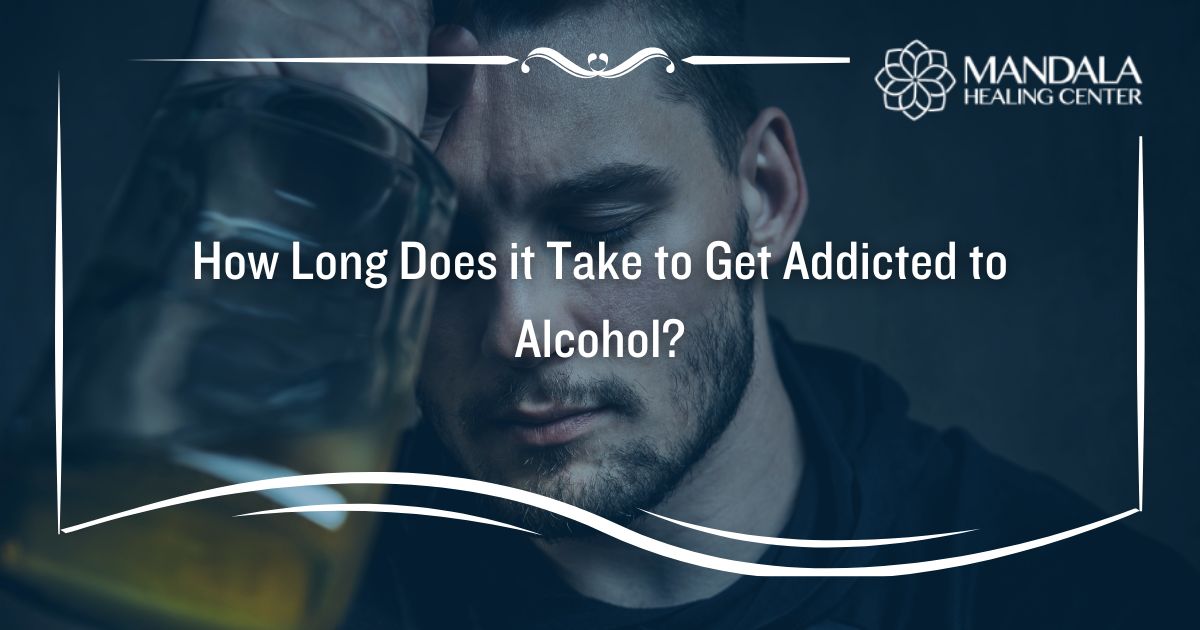Alcoholism is a chronic and progressive disease that affects millions of Americans each year. According to the National Institute on Alcohol Abuse and Alcoholism (NIAAA), nearly 30 million people struggled with an alcohol use disorder (AUD) in 2023.[1]
To explain, alcohol use disorder is characterized by compulsive drinking, experiencing intense cravings for alcohol, and being unable to control the amount of alcohol you consume. You might experience alcohol withdrawal symptoms when you stop drinking due to a physical dependency. Because alcoholism can lead to long-term health problems, you should always seek help from an alcohol rehab center.
If you regularly drink alcohol, you might be wondering how long it takes to develop an addiction. There is no set amount of time it takes to become an alcoholic. However, the amount you drink can influence your risk of developing the disorder.
For example, if you are a man, drinking more than four drinks in a single day or 14 throughout the week qualifies as heavy drinking, which increases your risk of alcoholism.[2]
In this article, you will learn:
- How long it takes to develop an alcohol use disorder
- What causes you to experience alcoholism
- What are the signs of alcohol addiction
- Is it easy to overcome alcohol use disorder
How Long Does it Take to Become an Alcoholic?
The amount of time it takes someone to develop alcoholism varies from person to person. One person could become addicted after a few weeks of continuous heavy drinking, while another takes years to establish alcoholism fully. You are more likely to become an alcoholic fast if you consume a lot of alcohol in short periods.
The Centers for Disease Control and Prevention (CDC) define heavy drinking as:[2]
- Men- Consuming more than 4 alcoholic drinks in one day or 14 drinks per week
- Women- having more than 3 alcoholic drinks in one day or more than 7 drinks per week
If you’re consuming more than 3 or 4 drinks on a single occasion, that is known as binge drinking. Binge drinking is another type of alcohol abuse that can speed up the development of alcoholism.
How Does Alcoholism Develop?
Alcohol addiction occurs when your body becomes so accustomed to having alcohol that you experience withdrawal symptoms without it. You might notice symptoms like shaking, sweating, nausea, and intense cravings for alcohol. Another major aspect of alcoholism is continuing to drink despite knowing it is causing negative effects in your life.
There is not one thing that causes alcoholism to develop. Instead, several risk factors increase your chances of experiencing the condition, including:[3]
- A family history of alcoholism
- Genetics
- Pre-existing mental health conditions
- Social environments
- Having a history of trauma
If you have one or more of these risk factors, drinking alcohol frequently will eventually lead to an addiction. While being at risk of alcoholism does not definitively mean you will develop it, it does mean you need to be careful when consuming alcohol.
What are the Signs of Alcohol Addiction?
The effects of alcohol can be incredibly habit-forming. You might feel relaxed, be able to socialize without anxiety, and forget about the stressors of your daily life. If you aren’t careful, you could engage in alcohol abuse so frequently that you become an alcoholic.
Knowing the signs of alcoholism can help you determine whether you need to attend a professional treatment program or Alcoholics Anonymous (AA).
According to Medline, the signs of alcohol use disorder include:[4]
- Drinking more or for longer than you intended to
- Wanting to cut down or stop drinking but being unsuccessful
- Spending a lot of time drinking or recovering from the effects of alcohol
- Experiencing intense and uncontrollable urges to drink
- Drinking interferes with your ability to perform at home, school, or work
- Continuing to drink even though it is causing problems in your relationships
- Giving up activities that you used to enjoy so you have more time to drink
- Getting into risky situations when you drink, such as driving under the influence
- Continuing to drink even though it is causing adverse mental and physical effects
- Needing to drink more and more to experience the desired effect
- Experiencing withdrawal symptoms when you stop drinking
If you have at least 2 of the symptoms of alcoholism, you qualify as having the condition. Thankfully, alcohol addiction treatment centers can help you overcome your symptoms and regain control over your life. If you or a loved one suffers from alcohol use disorder, contact the Mandala Healing Center to receive the support you need.
Is it Easy to Overcome Alcoholism?
Giving up alcohol when you suffer from an addiction is never easy. However, it is worth it. Once you stop drinking, you will have the chance to repair broken relationships, succeed in your career, and experience happiness without the assistance of substances.
The best way to overcome alcoholism is to attend a professional addiction treatment center. You will be provided with medically supervised detox, evidence-based therapies, relapse prevention planning, and more. While these services might not make recovery simple, they do make the process easier to cope with.
Find Help for Alcohol Abuse and Alcoholism
If you or a family member suffers from alcoholism, it’s time to seek professional help. At the Mandala Healing Center, we offer a compassionate approach to alcohol recovery, making it easy for you to open up about the root causes of your substance abuse.
Contact us today for more information on our alcohol rehab program.
References:
- The National Institute on Alcohol Abuse and Alcoholism (NIAAA): Alcohol Use Disorder (AUD) in the United States
- The Centers for Disease Control and Prevention (CDC): Facts About Excessive Drinking
- Oxford Academic: RISK FACTORS FOR ALCOHOL DEPENDENCE: A CASE-CONTROL STUDY
- Medline Plus: Alcohol Use Disorder (AUD)
















